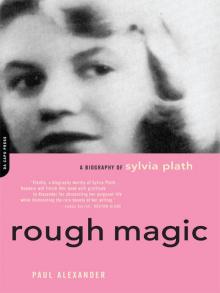- Home
- Paul Alexander
Rough Magic Page 3
Rough Magic Read online
Page 3
Today, while he lectured, he occasionally glanced at a young woman who had attracted his attention all year. Though he had been careful to keep his dealings with her strictly professional, he believed he had somehow come to know her well. She was enamored of the romantic, yet bound to the real world by an overpowering sense of the practical. She held herself with dignity—her face, round and bold as a full moon, personified her forthright nature—yet she was shrouded by timidity. She could be foolish and enjoy herself, he saw, but did not lose sight of the fact that foolishness, like everything else in life, has its place. Some days he wondered if she could read his thoughts, for lately he had been powerfully drawn to her even though, at forty-five, he was nearly twice her age.
During the year, Aurelia Schober had noticed her professor, Otto Plath. How could she not? Tall and slender, he struck an imposing image in front of his class. His piercing blue eyes and delicate lips were complemented by vivid red cheeks. He kept his shock of chestnut-brown hair cut short and combed neat, in accordance with the day’s fashion. Aurelia was not alone in her interest in Plath. Many of his young women students adored him. At German Club picnics some students’ main activity was flirting with Professor Plath. “Oh, Mr. Plath, what kind of bug is this?” a coed would coo as she dangled an insect before him. To which Plath would respond by giving the insect’s Latin name. But even if Aurelia had secret designs on Plath, what could she do? At this time in America, a young woman did not initiate a relationship with a man, especially one old enough to be her father.
So, after class, Aurelia tried to forget Plath as she headed across the campus on which she had spent so much of her life over the past six years. In the fall of 1924, when she had entered Boston University as a freshman, her father vehemently protested her earning a degree in a field filled with financial uncertainty. Instead of signing up for a curriculum featuring English and German, her first choices, she selected Vocational Studies as her major. Nevertheless, as if the degree plan were of her choosing, Aurelia maintained an excellent academic record in undergraduate school while holding down odd jobs to supplement the partial scholarships the school had awarded her. She also participated in such extracurricular activities as the English Club, the Writers’ Club, the Student Government Board, the German Club (for which she served as both vice-president and president), and Sivad, her college’s junior yearbook, on which she served as editor-in-chief. “The German Club nearly lost its sensational ‘young man,’ when Sivad won an efficient editor-in-chief,” the staff members wrote under her picture that year, “but Aurelia played both roles admirably. The staff will never forget those board meetings, those would-be ‘scoldings,’ and those cherished words of approval and praise.” Eclipsing even her high-school performance—she graduated as the second-highest-ranking student in her class, and therefore salutator, from Winthrop High School in 1924—Aurelia graduated as the top-ranking student, and therefore valedictorian, for the class of 1928 at BU’s College of Practical Arts and Letters.
Her bachelor’s degree in hand, Aurelia Schober pursued English and German after all, by accepting a job teaching those subjects at Melrose High School. But she had barely started her year of teaching when she decided to go for a master’s degree. Enrolling in BU’s College of Liberal Arts in the fall of 1929, she signed up for Otto Plath’s Middle High German and asked him to serve as both her academic adviser and her thesis reader. During the year, their relationship never became personal, so, when she stopped by Plath’s office on the day after the spring term ended to thank him for his help, she was shocked to be told that a colleague of Plath’s, Joseph Haskell, and his wife, Josephine, had invited Plath to bring a friend to an end-of-the-year weekend celebration at their country home—and she, Aurelia, was the friend he would like to take along. For a moment, Aurelia did not know what to say. Finally, she answered. Of course, she would be happy to join him, she said; it could be fun.
At the Haskells’, Otto explained to Aurelia that, though he had been infatuated with her throughout much of the year, William Marshall Warren, dean of liberal arts, had implored him not to show his feelings until she had completed her degree. Beyond being attracted to her physically, Otto also admired her intelligence. He believed that her thesis, The Paracelsus of History and Literature, a study of the controversial Swiss physician Paracelsus, whom many consider the father of modern chemistry, ranked among the best he had read recently. As the weekend progressed and Otto began to feel comfortable with Aurelia, he made an even more dramatic confession. Though “single,” Otto remained legally married to a woman he had not seen in thirteen years, a woman he would have to divorce should he ever wish to remarry. Despite his frankness, Otto mentioned neither his wife’s name, Lydia Clara Bartz, nor her whereabouts, Wisconsin. Besides revealing his marriage to her, Otto did not discuss Lydia Bartz at all. By the end of the weekend Aurelia had become fascinated enough with Plath so that when he suggested they remain in touch she agreed. Over the summer, as Plath taught summer school in Boston and Schober worked as a business manager at a camp for underprivileged children in Pine Bush, New York, they engaged in a correspondence during which Otto sketched in the story of his life.
On April 13, 1885, in the village of Grabow, Germany, he was born Otto Emil Platt, the first of six children of Theodore, an energetic blacksmith, and Ernestine (née Kottke), a deeply melancholic woman who as she aged appeared to be progressively weighed down by the care of her children, and by an ulcer on her leg that would never fully heal. In the summer of 1900, Otto, realizing that blacksmithing was falling out of demand as Germany reformed land ownership and industrialized its economy, set out on his own version of the immigrant’s journey. On September 8, after traveling by carriage and by train to Hamburg, he boarded the S.S. Auguste Victoria and endured the week-long voyage across the Atlantic to New York City. He was accompanied by a friend, Louis Schultz, and intended to head for Fall Creek, Wisconsin, to join his grandparents, who had immigrated there the year he was born. Otto stood on the deck of the ship that inched its laborious way into the harbor of New York and stared dreamily at the buildings of Manhattan towering up in the middle distance—beacons, he hoped, to a new future.
Taken with the city, Otto remained in Manhattan, living with an uncle in whose food-and-liquor store he clerked, and altering his name from “Platt” to “Plath.” He audited English classes at a grammar school until, after one year, he could read, write, and speak English flawlessly. A year after that, ready to tackle his next step—a formal education—he solicited financial support from his grandfather John, who agreed to underwrite his education if Otto would enter seminary, become a minister, and devote his life to the family religion, the Lutheran church. Eventually, Otto agreed. In the fall of 1903, he traveled to Watertown, Wisconsin, to enroll in the preparatory school affiliated with Northwestern College. Completing his junior, middle, and senior years while living with his grandparents in Fall Creek, he entered Northwestern College in the fall of 1906 and selected classical languages as his major. He graduated in 1910, distinguished by an all-A-and-B performance, and then began the Wisconsin Lutheran Seminary in Wauwatosa that fall. Just weeks into the term, though, Otto became disenchanted with the right-wing synod’s conservatism. When he told his grandfather about his misgivings, Otto was stunned by his reaction. Should Otto drop out, John warned, the repercussions would be considerable. Otto finally decided to withdraw anyway, and, as promised, Johns vengeance was severe. He excommunicated Otto from the family, a punishment he symbolized by striking—literally, with a pencil—Ottos name from the Plath Bible.
Devastated but relieved, Otto moved to Seattle, where, while teaching German at the University Heights School, he studied the language at the University of Washington. Plath was to spend the next two decades crisscrossing the country, studying and teaching German and biology, the latter of which he acquired a passion for at Northwestern after reading Darwin. In those years, he earned a master of arts (University of Washington, 1912), a master
of science (Harvard University, 1925), and a doctorate of science (Harvard, 1928). He also held graduate and faculty posts in German and biology at Columbia, M.I.T., Johns Hopkins, and the universities of Washington and California (Berkeley). On November 5, 1918, his father died at the age of sixty-eight, of an abscess on his lung, in Harney, Oregon, where he had lived as a farmer following his initial immigration to North Dakota.
Plath found a home at Boston University in 1922. During the twenties, he advanced from instructor of German to instructor of German and biology to professor of biology. Over the years, he also engaged in research in various biological fields, including the crossbreeding patterns of finches, the lives of fly larvae that suck the blood of nesting birds, and the habits of bumblebees. He published his findings in such journals as Psyche, The American Naturalist, Biological Bulletin, and The Bulletin of the Brooklyn Entomological Society.
So, by the fall of 1929, the semester Aurelia re-entered Boston University to become his student, Plath was well on his way towards establishing a national reputation in his field. Not that he had achieved this professional plateau without suffering. Because of the transient nature of his employment, and because of the endless hours he spent working in laboratories or libraries, all Plath had to show for his private life over the past twenty years was a marriage to Lydia Bartz, whom he had met at Northwestern through his friend (her brother) Rupert Bartz, which lasted only months.
During the summer of 1930, Aurelia answered each of Otto’s letters, in the process chronicling her own family history. In 1894, not far from Grabow, Germany, a fourteen-year-old boy, Franz Schober, left his birthplace of Bad Aussee, Austria, and traveled through the Alps to northern Italy to settle in a village near Venice. Two years later, he moved to Paris; two years after that, London. One afternoon, at the London hotel where he worked as a waiter, Franz, unwavering in his self-confidence, boasted to fellow employee Joseph Grunwald, as he looked at a photograph of his sixteen-year-old sister, Aurelia, “Someday I’ll marry the girl.” By 1902, the odds of this happening seemed small, since Aurelia lived in Vienna and Franz had sailed from England to Boston to take up residence in a boarding house owned by Joseph, who had immigrated somewhat earlier than he had. If by 1904 Franz, who Americanized his first name to Francis (nicknamed Frank) at the same time Joseph changed his last to Greenwood, felt any doubts about his last move, they were dispelled on the afternoon he answered the boarding-house door to discover the girl in the photograph—Aurelia. He had known she was sailing to America, but here she was—even more beautiful than he had imagined.
As the romance immediately started to grow between Aurelia and Frank, Aurelia’s father voiced objections, but these only strengthened their commitment to each other. Finally, on July 3, 1905, the day Aurelia turned eighteen—the minimum age in Massachusetts at which one could many without parental consent—she and Frank filed for a marriage certificate. On July 10, once the required one-week grace period had elapsed, Frank Schober married Aurelia Greenwood in a civil ceremony. Not a year later, on April 26, 1906, Aurelia gave birth to a daughter, whom they decided to name after them both, Aurelia Frances.
The Schobers rented a two-stoiy house at 33 Peter Polly Road in the Boston suburb of Jamaica Plain, then soon afterwards purchased a house in Winthrop Center, a village northeast of Boston on the Winthrop Peninsula. But within a year they had relocated a third— and final—time, buying a rambling beach house on the southeastern-most tip of the peninsula, Point Shirley. And here, at 892 Shirley Street, on a road that literally dead-ended into water, the Schobers raised a family that grew to include a son and another daughter (Frank Junior and Dorothy, respectively five and thirteen years younger than Aurelia). Behind the house lay the Atlantic Ocean. Out front, beyond a row of houses lining the other side of the two-lane road, Boston Harbor’s water rose and fell peacefully. Directly to the south of the peninsula was Deer Island, home of a state prison. It would be in this location that the younger Aurelia spent most of her girlhood—an exotic world that instilled in her a lifelong love of the ocean.
Becoming citizens as soon as they were eligible, Frank and Aurelia proceeded to assimilate themselves into the mainstream in America; they even bucked the trend of most immigrants of the day and voted Republican. In the 1910s, swept up by the day’s booming financial climate, Frank began working as an accountant for the Dorothy Muriel Company, often supplementing his salary with wise stock-market investments. (In the twenties, he lost substantial sums through errant market speculations, after which Aurelia assumed control of the family’s money.) Yet regardless of how they embraced the American system, the Schobers did not shun their German ancestry; they spoke the language at home until their children entered grammar school. As a result, at the beginning of World War I, which broke out when Aurelia was eight years old, the Schobers became open targets for anti-German attacks in Winthrop, a predominantly Irish-Italian community. Usually this harassment took the form of verbal assaults, although once a student shoved Aurelia to the ground from the door of the school bus while the driver and her fellow students turned their heads the other way. Chauvinism notwithstanding, Aurelia had an almost idyllic youth on Point Shirley. An excellent student, she spent the summers enjoying the beach and reading—tirelessly. By her senior year in high school, she knew much of Scott, Dickens, Thackeray, Eliot, Hardy, Galsworthy, Cooper, Hawthorne, Melville, and Henry James. Though she loved the Brontes and Jane Austen, her favorite writer was not a novelist but a poet, Emily Dickinson. Soon Aurelia decided to become a writer. After all, she had so much to write about. Life near the ocean brought with it picnics in rowboats a mile out to sea, beachcombing at midnight, and floods that washed up such treasures as mussel shells, tea sets, and (on one occasion) a dead shark. But in the face of her father’s strong disapproval she did not pursue her impulse to write as diligently as she might have.
Drawn closer together by the letters they had exchanged that summer, Otto and Aurelia began dating when Aurelia returned to Boston in September to assume the Brookline High School faculty post she had been offered. Almost immediately, weekend hiking trips, afternoon strolls through the Arnold Arboretum, and nights at the theatre launched the couple into a serious romance. Before long, they openly discussed marriage. Finally, just after Christmas 1931, they left Boston by car and, chaperoned by Aurelia’s mother, drove cross-country to Carson City, Nevada, where on Monday, January 4, 1932, Otto filed for and received a divorce from Lydia Bartz, the woman he had not seen in over a decade. Later that same day, Otto Plath and Aurelia Schober, each of whom swore in writing to be a current resident of Reno, Nevada, were married in a civil ceremony in Carson City, at Ormsby County’s courthouse.
Following a honeymoon in Nevada, the Plaths, still accompanied by Aurelia’s mother, drove back to Boston to begin their married life. Aurelia moved into Otto’s apartment, a six-room first-floor rental in a house at 24 Prince Street in Jamaica Plain. Before she could resume her teaching job at Brookline High, Otto insisted that she resign, which she did even though she was a successful teacher and a probable future chairman of the German Department. Otto wanted Aurelia to become a full-time housewife, and he wished to start a family as soon as possible. In fact, they would become parents much sooner than even Otto had hoped: only weeks into the marriage Aurelia became pregnant. In anticipation of the event, Aurelia readied a nursery, bought baby clothes, and began to read about the various philosophies of child-rearing. Finally, on Thursday, October 27, 1932—three weeks early, the Plaths retorted to smiling friends who had been keeping track of the months—Aurelia checked in to Memorial Hospital on Stoughton Street in Boston and at ten after two in the afternoon gave birth to an eight-pound-three-ounce baby girl. The attending physicians, Drs. J. J. Abrams and Edwin Smith, reported that the infant appeared healthy, content, alert. And when the new parents examined the list of names they had assembled, they determined—for no other reason than because they liked the sound of the name—that she would be Sylvia, Sylvia Plat
h.
2
Disregarding the days popular parenting trends, which had mothers feeding their babies according to strict timetables, coddling them sparingly, and ignoring them if they cried, Aurelia followed her own instincts and fed Sylvia on demand, rocked her frequently, and picked her up when she was fretful. Aurelia strengthened her convictions about child-rearing by studying experts who deviated from accepted trends, such as Friedrich Froebel, whose Educating Man she read at Otto’s suggestion, and Maria Montessori.

 Rough Magic
Rough Magic Dark Star
Dark Star Salinger
Salinger